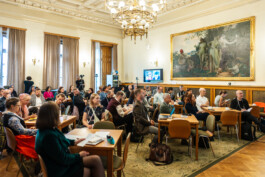
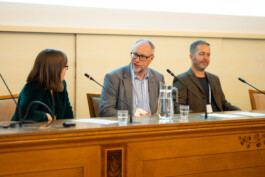
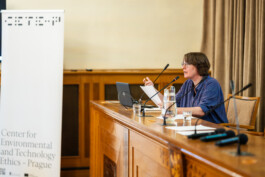
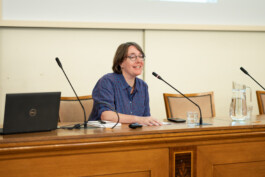
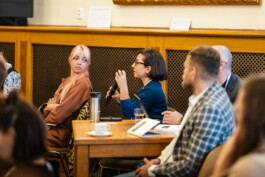
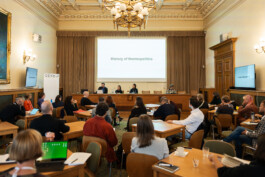
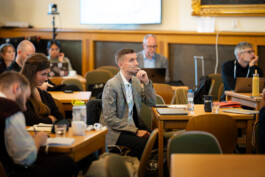
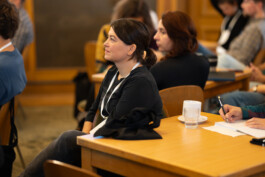
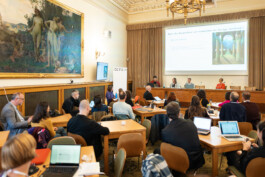
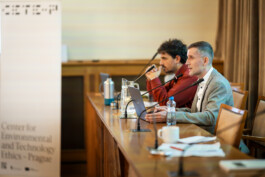
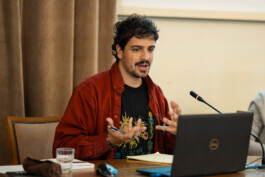
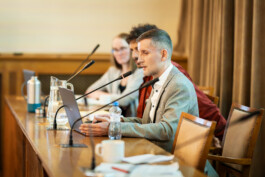
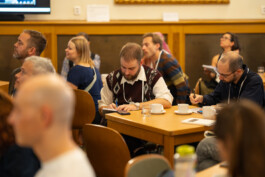
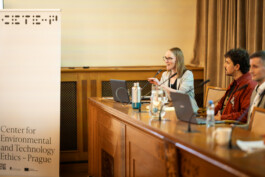
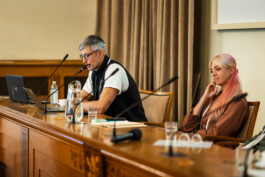
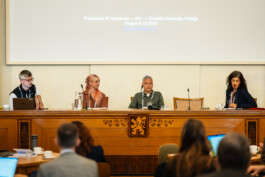
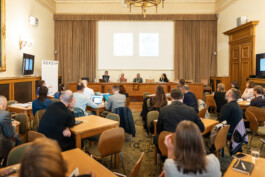
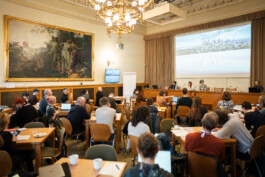
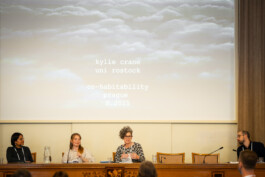
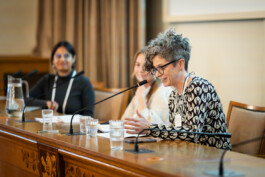
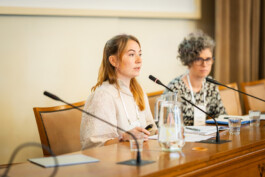
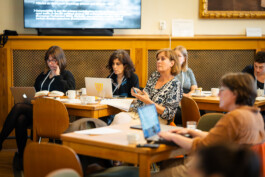
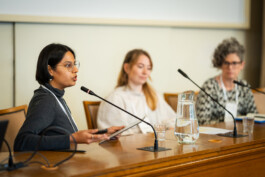
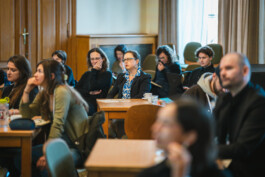
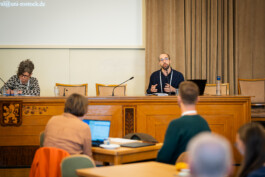
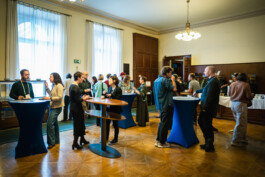
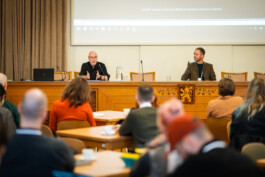
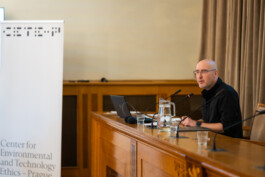
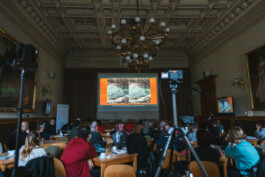
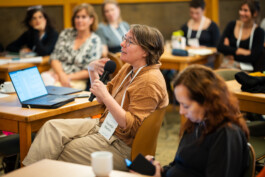
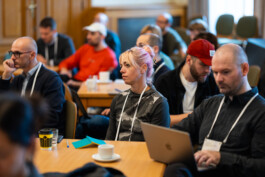
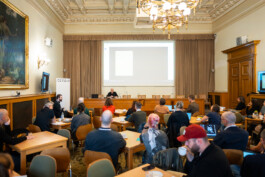
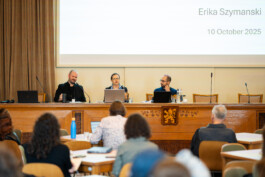
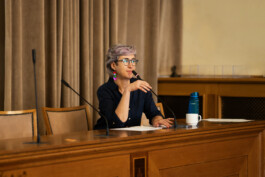
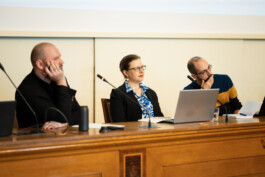
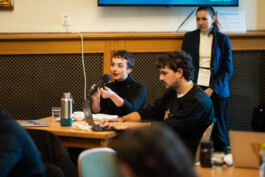
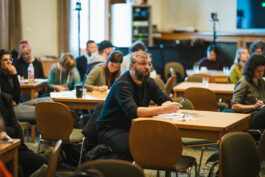
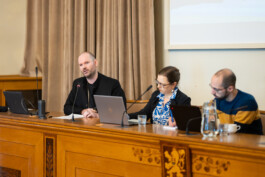
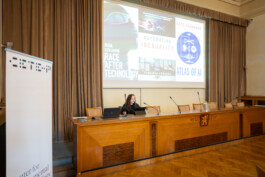
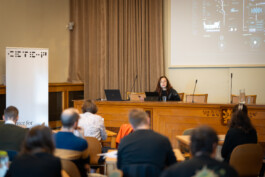
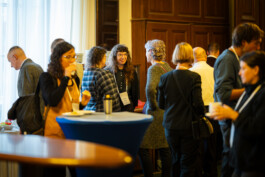
From 8 to 10 October 2025, CETE-P members Iwona Janicka, Mark Coeckelbergh, and Petr Urban organized the international conference Cohabitability: Ecologies and Technologies of Living on Earth at the Czech Academy of Sciences’ main building in Prague.
Across three days, over thirty participants from across Europe and the US examined how ecology and technology shape the conditions of living together among humans, nonhumans, and the environment. The program reflected how these themes intersect, with panels building on each other and extending insights from previous contributions.
The opening keynote by Noortje Marres (University of Warwick), “Postnormal: On the Impossibility of Co-existence with Technology in the Street", explored the everyday entanglement of people with technological infrastructures. Panels on the first day addressed the role of technomoral habits and translational imagination for cohabitable futures, the use of AI for representing nonhuman animals, caring machines, planetary health, as well as ethnographic examples such as insect farming and interspecies fishing in the Global South. You can watch the opening keynote in full length here.
On Thursday, Jussi Parikka’s (Aarhus University) keynote “Light, Heat, Data: Invisual Agriculture” examined agriculture as a sphere where environmental data meets technology. The day’s sessions extended these themes into air as commons, arts of cohabitability, philosophy of eco-tech, and multispecies entanglements, with contributions spanning healing-garden research, techniques of sensing, and ecologies in deep time. You can watch Jussi Parikka's keynote in full length here.
Friday’s keynote by Joanna Zylinska (King’s College London), “Bio-AI: The Aesthetics and Ethics of Digital Ecologies", traced how artificial intelligence operates as a “relational technology of life". You can watch this keynote in full length here.
Subsequent panels considered cohabitability through architecture and design, affirmative critique, and the politics of restoration, before turning to the final panel on urban cohabitabilities, which explored coexistence within unpredictable environments.
The event was marked by smooth transitions between conceptual, empirical, and artistic contributions, enabling participants to approach cohabitability as a shared field of ethical and aesthetic inquiry. Discussions often carried forward across breaks and meals, sustained by generous vegan and vegetarian catering.
Thanks to the attentive organization, the thoughtfully balanced program, and the engaged contributions from scholars and practitioners across different fields, the conference succeeded in advancing our understanding of the entanglements between technologies and ecologies of living on Earth.
Selected contributions from the conference will be published in a special issue of a major academic journal co-edited by the conference organizers.
Photos: Romana Kovacs








































From 8 to 10 October 2025, CETE-P members Iwona Janicka, Mark Coeckelbergh, and Petr Urban organized the international conference Cohabitability: Ecologies and Technologies of Living on Earth at the Czech Academy of Sciences’ main building in Prague.
Across three days, over thirty participants from across Europe and the US examined how ecology and technology shape the conditions of living together among humans, nonhumans, and the environment. The program reflected how these themes intersect, with panels building on each other and extending insights from previous contributions.
The opening keynote by Noortje Marres (University of Warwick), “Postnormal: On the Impossibility of Co-existence with Technology in the Street", explored the everyday entanglement of people with technological infrastructures. Panels on the first day addressed the role of technomoral habits and translational imagination for cohabitable futures, the use of AI for representing nonhuman animals, caring machines, planetary health, as well as ethnographic examples such as insect farming and interspecies fishing in the Global South. You can watch the opening keynote in full length here.
On Thursday, Jussi Parikka’s (Aarhus University) keynote “Light, Heat, Data: Invisual Agriculture” examined agriculture as a sphere where environmental data meets technology. The day’s sessions extended these themes into air as commons, arts of cohabitability, philosophy of eco-tech, and multispecies entanglements, with contributions spanning healing-garden research, techniques of sensing, and ecologies in deep time. You can watch Jussi Parikka's keynote in full length here.
Friday’s keynote by Joanna Zylinska (King’s College London), “Bio-AI: The Aesthetics and Ethics of Digital Ecologies", traced how artificial intelligence operates as a “relational technology of life". You can watch this keynote in full length here.
Subsequent panels considered cohabitability through architecture and design, affirmative critique, and the politics of restoration, before turning to the final panel on urban cohabitabilities, which explored coexistence within unpredictable environments.
The event was marked by smooth transitions between conceptual, empirical, and artistic contributions, enabling participants to approach cohabitability as a shared field of ethical and aesthetic inquiry. Discussions often carried forward across breaks and meals, sustained by generous vegan and vegetarian catering.
Thanks to the attentive organization, the thoughtfully balanced program, and the engaged contributions from scholars and practitioners across different fields, the conference succeeded in advancing our understanding of the entanglements between technologies and ecologies of living on Earth.
Selected contributions from the conference will be published in a special issue of a major academic journal co-edited by the conference organizers.
Photos: Romana Kovacs
•• All News
Celetná 988/38
Prague 1
Czech Republic
This project receives funding from the Horizon EU Framework Programme under Grant Agreement No. 101086898.